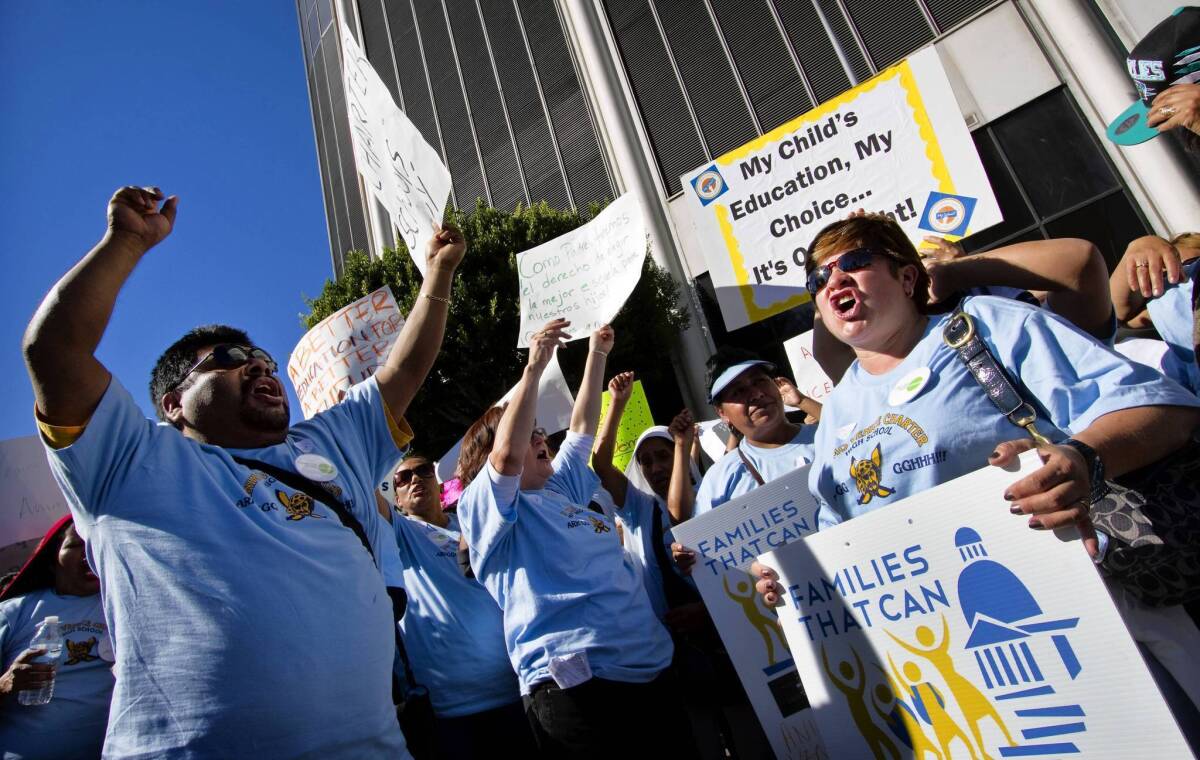LAUSD restores full academic year and full pay

- Share via
The Los Angeles school board swiftly voted Tuesday to restore a full academic year — and full pay for employees — a week after California voters approved a revenue measure that protects schools and universities from further budget cuts this year.
More controversial were two resolutions before the Board of Education with potential effects for charter schools — one sought more oversight and the other to charge fees when charters claim more space on traditional campuses than they need.
The first resolution failed; the other passed in a form more affordable for charters.
After a brief presentation from L.A. schools Supt. John Deasy, the board voted 7 to 0, without discussion, to increase the academic year for students from 175 to the full 180 days. In the same action, employees won back 10 days of lost pay, the positive fallout from voter approval of Proposition 30, a temporary tax increase.
“The immediate good news,” Deasy said, is “the ability to finally say to our employees: You work a whole year and you get paid a whole year.”
For students and parents, the restored school days will be added to the second semester. In the short term that means there will be a one-week holiday for Thanksgiving, starting on the previous Monday.
Deasy said it would be too disruptive to families to revise the fall schedule.
He had been prepared for a more gloomy post-election denouement, including a school year shortened by 20 days, but “the terrible reality of immediate cuts” will not occur because voters approved Proposition 30, Deasy said.
The tax measure was designed to protect the current budget, not to provide an immediate windfall, but Deasy said the Los Angeles Unified School District still could afford to reverse previously approved cuts.
Deasy also warned of another state budget shortfall for next year. In addition, he spoke of the “fiscal cliff” — the automatic cuts in federal funding that will occur unless there is a new budget deal between President Obama and Congress. Failing that, L.A. Unified would have to make up a shortfall in excess of $60 million before next year, Deasy said.
The charter proposals prompted a demonstration that drew more than 1,000 participants.
Charters are independently managed and exempt from some rules that govern traditional schools. L.A. Unified has more charters than any other school system in the nation.
In its original form, a resolution by board member Steve Zimmer called for a moratorium on new charter schools, which would possibly be illegal under state law. Zimmer reworked his proposal to ask charter operators to suspend their growth temporarily.
Charter advocates flexed their financial and organizational muscle through three rallies at the school board. A political action committee, the California Charter Schools Assn. Advocates, paid for a political-style mailer against Zimmer, who is up for reelection in March. The group also paid for a radio ad that aired on three stations.
There was confusion among many protesting parents over the final resolution, which would have directed Deasy to help schools share best practices and develop a better system for charters to turn in student data to L.A. Unified. It also called for improved oversight of charters and better management of campuses shared by charters and traditional schools.
“They want to take away our right to have our children in the schools of our choice,” said charter parent Linda Sauceda, who participated in the rally. Standing in front of a group of parents, all clad in evergreen-hued T-shirts, Sauceda said she understood that the resolution would close charter schools. Several parents nodded in agreement.
Regardless of the evolving details, “the whole spirit of the resolution is off the mark,” said Jed Wallace, chief executive of the California Charter Schools Assn. “The parents will remain engaged until the school district fully embraces charter schools and allows them to grow and thrive.”
A second resolution, from board member Bennett Kayser, sought to enforce a financial penalty allowed under state law. The fee can be triggered when charters overestimate their enrollment and receive extra classroom space as a result.
The board voted to apply any penalties on a case-by-case basis, and only in future years.
howard.blume@latimes.comTimes staff writer Dalina Castellanos contributed to this report.
More to Read
Sign up for Essential California
The most important California stories and recommendations in your inbox every morning.
You may occasionally receive promotional content from the Los Angeles Times.











